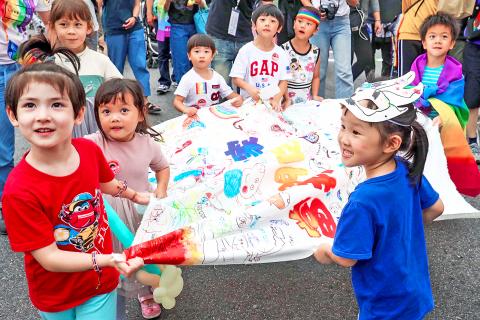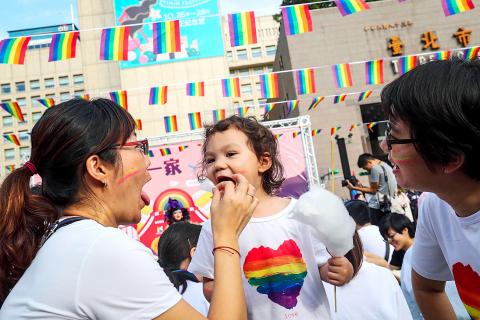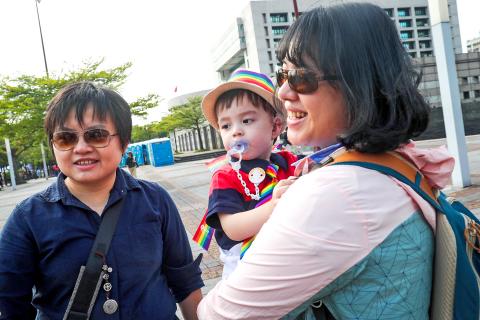On Geoffrey Lee’s 40th birthday last year, he put aside his dream of early retirement on an idyllic island and instead decided to raise a child in Taiwan using a surrogate in Southeast Asia.
Lee and his husband — whose twin boys are now three months — are among an increasing number of gay couples in Taiwan becoming parents through surrogacy, even though the procedure is illegal in the country.
Taiwan became the first country in Asia to legalize gay marriage in May and more than 2,000 same-sex couples have since wed, prompting a rush of commercial surrogacy agencies to head to Taiwan to help more LGBT couples seeking to start families.

Photo: CNA
“Having a child in the world to care for, who will return our love unconditionally, is an amazing experience we did not expect to have,” Lee said.
Globally, the popularity of surrogacy — where a surrogate mother is either implanted with a sperm and egg or becomes pregnant using her own egg — is soaring, particularly among LGBT couples who want to become parents.
Global fertility services were estimated in an initial valuation to be worth about US$21 billion last year, with the industry forecast to grow to US$41 billion by 2026, according to India-based market research firm Data Bridge.

Photo: CNA
Surrogacy laws around the world vary. For example, Taiwan, France and Germany prohibit all forms of surrogacy, while Britain, Canada and New Zealand allow some forms of altruistic surrogacy, but it is illegal to pay a woman for her services.
Taiwan’s Assisted Reproduction Act forbids any form of surrogacy and any attempts to amend laws, as recently as 2017, have failed due to opposition from women and children’s rights groups.
Conservative groups, such as the Coalition for the Happiness of Our Next Generation, have actively campaigned against LGBT parenting and marriage equality.

Photo: CNA
But although two-thirds of voters — about seven million people — opposed changing the country’s civil code to recognize same-sex marriage in a referendum last year, the legislature in May passed a law legalizing gay marriage.
NEW FRONTIER
Under current laws, same-sex couples can only adopt children who are biologically related to at least one of them, with activists marking this as one of the next frontiers in the fight for LGBT equality.
The Taiwan LGBT Family Rights Advocacy (TLFRA) group said they were in contact with at least 300 “rainbow families” and expected the number of same-sex parents to rise as the new gay marriage law spurred visibility and acceptance.
“Part of the [LGBT] community is celebrating, while part of the community has a lot of fighting to do,” said Chu Chia-jung (朱家瑢), administrative secretary of TLFRA.
This has been encouraged by the arrival of commercial surrogacy agencies, mainly from the US, in Taiwan, where hundreds of gay couples are willing to pay up to US$140,000 to start a family — almost 10 times the average annual salary.
There is no legislation concerning surrogacy at the federal level in the US and some states allow commercial surrogacy arrangements.
Men Having Babies, a New York-based non-profit that helps gay men become fathers through surrogacy, hosted its first conference for prospective Asian gay parents in Taipei in March.
About 320 people attended, forcing the organizers to request a space twice the size of the room originally booked.
“People were reveling in it. They were proud of the fact this was happening,” said group founder Ron Poole-Dayan, who was part of one of the first same-sex couples in the US to father children through gestational surrogacy.
American Fertility Services, San Diego Fertility Center and International Surrogacy Center were among the sponsors of the event, which included a panel on budgeting, testimonies from parents and surrogates and onsite consultations with clinics.
DIVIDED PUBLIC
Jerald Goldstein, founder of Fertility Specialists of Texas, attended the conference as part of a bid to build businesses in Taiwan and China.
He said clients from Taiwan had gone from zero a few years ago to dozens coming to the US for surrogacy, with Taiwanese culture placing high importance on family blood lines.
“There has been more interest; we have been seeing more patients from there,” he said.
Tsou Tsung-han (鄒宗翰), 35, a journalist in Taipei, and his husband, who works in logistics management for a technology company, bought a 40-year-old apartment that needed work rather than a dream new flat and stopped holidays to save money for surrogacy.
The pair, whose parents are factory workers and farmers, have also applied for financial assistance from Men Having Babies, without which they would not be able to continue.
Tsou said it was unfair that current adoption laws were pushing same-sex couples to spend vast sums conceiving a child.
“The reason we are doing the surrogacy thing is because it is the only option for us,” he said.
Some couples opt for legal surrogacy “gray areas” such as Cambodia, which has no laws against surrogacy, or Russia, where surrogacy is legal for straight couples and single women who are medically unable to conceive a child themselves.
But a lack of clear regulations can create problems when leaving the country or registering the child in Taiwan, according to TLFRA.
Yu Mei-nu (尤美女), a lawmaker for the ruling Democratic Progressive Party (DPP), said Taiwanese society remained divided on the issue of LGBT parenting, with some groups saying children needed both a male and a female parent to develop successfully.
But she said allowing gay marriage had “opened a door” for same-sex families.
“It was difficult to discuss the issues related to adoption rights of the same-sex spouses in our society and in our parliament,” Yu said.
Jack, 31, who lives with his boyfriend of nine years in Miaoli County in the west of Taiwan, has created an embryo in a country in Europe and is currently in the process of having it transferred to the surrogate.
Jack did not want to give his full name for fear of repercussions as both he and his family were concerned about people’s reactions to his as-yet-unborn child, aware that public opinion in Taiwan remained sharply divided.
“Some people in Taiwan hate homosexuals,” Jack said. “But I told my family that if all of us love my children, they will have the ability to face all of the evil things in the world.”

Taiwan Power Co (Taipower, 台電) and the New Taipei City Government in May last year agreed to allow the activation of a spent fuel storage facility for the Jinshan Nuclear Power Plant in Shihmen District (石門). The deal ended eleven years of legal wrangling. According to the Taipower announcement, the city government engaged in repeated delays, failing to approve water and soil conservation plans. Taipower said at the time that plans for another dry storage facility for the Guosheng Nuclear Power Plant in New Taipei City’s Wanli District (萬里) remained stuck in legal limbo. Later that year an agreement was reached

What does the Taiwan People’s Party (TPP) in the Huang Kuo-chang (黃國昌) era stand for? What sets it apart from their allies, the Chinese Nationalist Party (KMT)? With some shifts in tone and emphasis, the KMT’s stances have not changed significantly since the late 2000s and the era of former president Ma Ying-jeou (馬英九). The Democratic Progressive Party’s (DPP) current platform formed in the mid-2010s under the guidance of Tsai Ing-wen (蔡英文), and current President William Lai (賴清德) campaigned on continuity. Though their ideological stances may be a bit stale, they have the advantage of being broadly understood by the voters.

In a high-rise office building in Taipei’s government district, the primary agency for maintaining links to Thailand’s 108 Yunnan villages — which are home to a population of around 200,000 descendants of the Chinese Nationalist Party (KMT) armies stranded in Thailand following the Chinese Civil War — is the Overseas Community Affairs Council (OCAC). Established in China in 1926, the OCAC was born of a mandate to support Chinese education, culture and economic development in far flung Chinese diaspora communities, which, especially in southeast Asia, had underwritten the military insurgencies against the Qing Dynasty that led to the founding of

Artifacts found at archeological sites in France and Spain along the Bay of Biscay shoreline show that humans have been crafting tools from whale bones since more than 20,000 years ago, illustrating anew the resourcefulness of prehistoric people. The tools, primarily hunting implements such as projectile points, were fashioned from the bones of at least five species of large whales, the researchers said. Bones from sperm whales were the most abundant, followed by fin whales, gray whales, right or bowhead whales — two species indistinguishable with the analytical method used in the study — and blue whales. With seafaring capabilities by humans